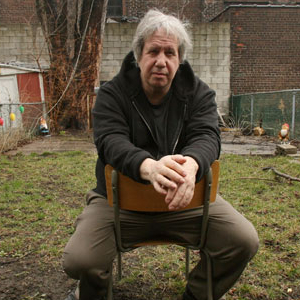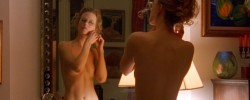
TIFF 2013 Interview: Alan Zweig on When Jews Were Funny

Editor’s Notes: The following interview is part of our coverage of the 2013 Toronto International Film Festival. For more information on the festival visit http://tiff.net and follow TIFF on Twitter at @TIFF_NET.
Acclaimed Toronto documentary filmmaker Alan Zweig (Vinyl, A Hard Name) has a knack of bringing the personal out of his subjects while still keeping it to the heart. He brings his new film, When Jews Were Funny, to The 2013 Toronto Film Festival. It’s a 90-minute examination of Jewish identity in a series of interviews with Jewish comedians.
—
Jacqueline: I enjoyed your film immensely mostly because as an interviewer your documentary style sets the subject at ease. You elicit some pretty poignant moments here. Does it come naturally to you?

Alan Zweig: I did my first documentary fifteen years ago and I didn’t think about being an interviewer. I wanted to find out about things and this was the best way for me to do it. After asking people questions and people giving me feedback with each successive film, telling me I had a style. I started to get self-conscious about it. But eventually I forgot about all that and just focus on what I wanted to learn. I guess it’s not really about being an interviewer; it’s about having a conversation. So in essence I’m just some guy having a conversation with people. It doesn’t come naturally to me. We’re just having a conversation.
Also, one thing I want people to know is that hanging out with a group of people, my friends often tell me that I’m a funny guy. I can move a conversation pretty well. In Los Angeles, however, I’m just another guy. I’m a nobody who’s around asking questions. You know, I kind of have to keep my head down, ask my questions and see where the conversation goes. Sometimes the conversation took us other places or my questions were answered with more questions. I mean, it sometimes would start off with people wondering what I wanted from them.
A lot of the time was spent trying to contact them, arrange for interviews, and finally getting to sit down with them. You pretty much have to let the conversation flow.
Jacqueline: We see some uncomfortable moments on camera, particularly with Bob Epstein (Super Dave Osborne). Were there many of them off camera too?
Alan Zweig: It’s funny because some of them were being funny or challenging because it’s who they are and what they do. It was hard to figure out if this was their act or just a defense.
In the case of Bob Epstein, he was my hardest interview. When he told me that story about his father, I thought we had enough there and almost said to the crew that we could go. However, that story is one of those stories that if you’re father told you that story, it sticks with you. It was funny….
Jacqueline: You turned the joke back on him! I thought that was quite clever, especially since he looked irritated…
Alan Zweig: You can’t shrink in those moments because what are you going to do? I was making a film and I did my best to get the footage I went looking for. I had a moment there with Bob and went with it. I think he could have been also joking. He’s Super Dave. He’s done his time. So yeah, he’s been doing this for a long time and although it might have been a sticky situation, it was also a fun one to be in.
Jacqueline: What made you pick the topic of Jewish comedians for this film?
Alan Zweig: I didn’t set upon making a film about Jewish comedians. I kind of started to make a film about Jewish culture and what it means to be Jewish. In the process of starting the conversation I just ended up asking the same sort of questions about what it meant to be Jewish and a comedian because it’s a common link in our culture. We’re funny people!
Jacqueline: I know you’d also ask them about what you could do for your daughter and how to link her to heritage. Did you find the answers you were looking for there?
Alan Zweig: I did. Because there is a connection there that I didn’t notice and when I would ask them these questions they’d probe my own motives.
* Alan stops to ask someone if they’d lost their umbrella and sounds both worried that the umbrella he’s spotted has lost it’s owner. When all is fine, he comes back and continues… *
Alan Zweig: I said I wanted to know what I could do to bring this to my daughter. They’d throw it back at me and said that I was doing it already. By making this film, by interviewing these people, by being who I was, I was already doing it.
Jacqueline: You seem like someone who is a continual learner and that’ll you’ll always be asking new questions out of life. What next in the horizon for you project-wise?
Alan Zweig: I think my next project is…there’s something that’s been on my mind for a while now. The topic of death intrigues me. We all die and what we can do to stop worrying about it or being scared of it? It’s really a stupid thing to be scared about since it’s going to happen anyway and there’s nothing we can do to prevent it. How do we live with the idea that life will end and how can we can just stop thinking about it and live? That’s the kind of stuff I might work on next.
Related Posts
Jacqueline Valencia
Latest posts by Jacqueline Valencia (see all)
- TIFFF 2013 Interview: Hitoshi Matsumoto on R100 - September 16, 2013
- TIFF 2013 Review: Manakamana (2013) - NP Approved - September 13, 2013
- TIFF 2013 Interview: Bruce Sweeney, Gabrielle Rose, and Tom Scholte on The Dick Knost Show - September 12, 2013































